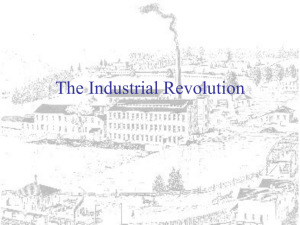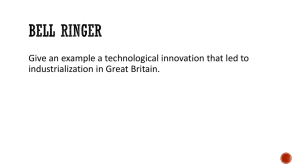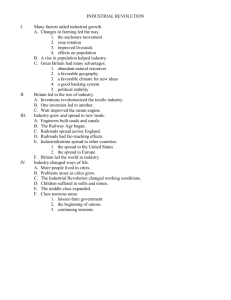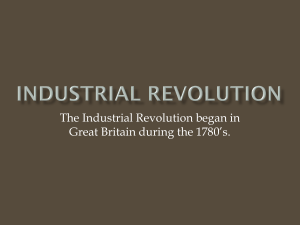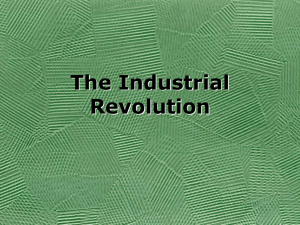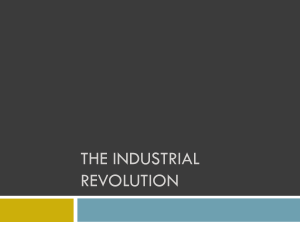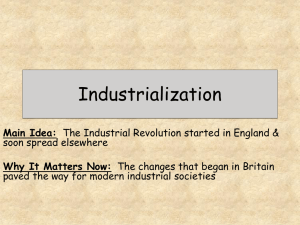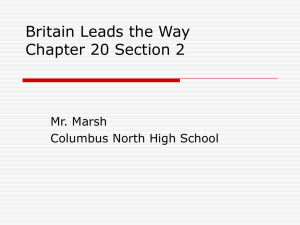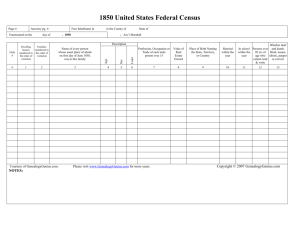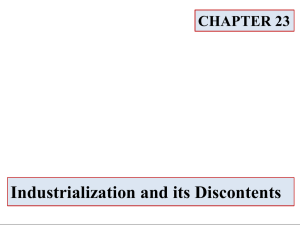Industrialization Text Notes
advertisement
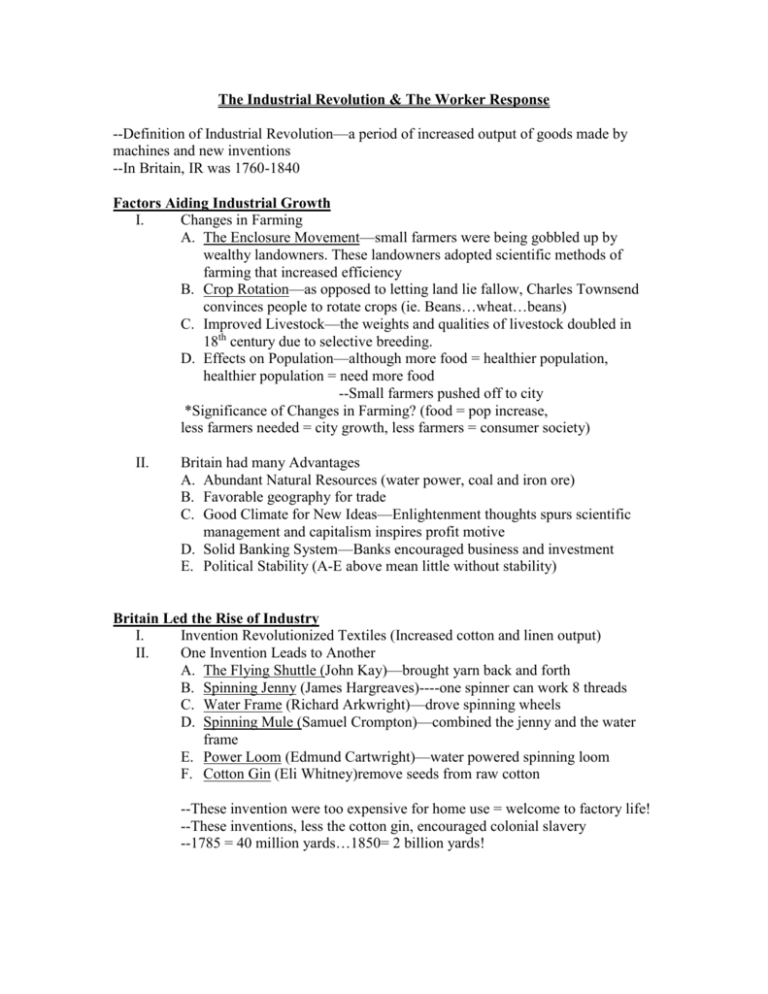
The Industrial Revolution & The Worker Response --Definition of Industrial Revolution—a period of increased output of goods made by machines and new inventions --In Britain, IR was 1760-1840 Factors Aiding Industrial Growth I. Changes in Farming A. The Enclosure Movement—small farmers were being gobbled up by wealthy landowners. These landowners adopted scientific methods of farming that increased efficiency B. Crop Rotation—as opposed to letting land lie fallow, Charles Townsend convinces people to rotate crops (ie. Beans…wheat…beans) C. Improved Livestock—the weights and qualities of livestock doubled in 18th century due to selective breeding. D. Effects on Population—although more food = healthier population, healthier population = need more food --Small farmers pushed off to city *Significance of Changes in Farming? (food = pop increase, less farmers needed = city growth, less farmers = consumer society) II. Britain had many Advantages A. Abundant Natural Resources (water power, coal and iron ore) B. Favorable geography for trade C. Good Climate for New Ideas—Enlightenment thoughts spurs scientific management and capitalism inspires profit motive D. Solid Banking System—Banks encouraged business and investment E. Political Stability (A-E above mean little without stability) Britain Led the Rise of Industry I. Invention Revolutionized Textiles (Increased cotton and linen output) II. One Invention Leads to Another A. The Flying Shuttle (John Kay)—brought yarn back and forth B. Spinning Jenny (James Hargreaves)----one spinner can work 8 threads C. Water Frame (Richard Arkwright)—drove spinning wheels D. Spinning Mule (Samuel Crompton)—combined the jenny and the water frame E. Power Loom (Edmund Cartwright)—water powered spinning loom F. Cotton Gin (Eli Whitney)remove seeds from raw cotton --These invention were too expensive for home use = welcome to factory life! --These inventions, less the cotton gin, encouraged colonial slavery --1785 = 40 million yards…1850= 2 billion yards! III. Watt Improved the Steam Engine A. Early mills needed to be near a water source B. Stem Engine can be used anywhere, anytime Impact of these inventions of labor (esp. skilled labor) Slavery, Women Entrepreneurship in Inventing & Selling Rise of the Bourgeoisie and The Merchant & Trading Classes Industry Spread to New Lands I. Engineers Built Roads and Canals A. Canals are faster than horses and mules B. Roads helped land travel II. The Railway Age Began A. Railways are not new (horses pulled on them), but steam locomotives are B. 1821 = first rail line from Yorkshire coal fields to the North Sea III. Railroads Spread Across England A. 1830 = Liverpool-Manchester line opened (took passengers also) B. By 1850, Britain was connected IV. Effects of Railroads A. Encouraged Industrial Growth (cheaper and more efficient transportation) B. Jobs (leveling hills, laying track, building bridges, coal and iron mining) C. Boost Agriculture Sector (send fresh milk and fish) D. Inspired Travel…opened minds V. Industrialization Spread Abroad A. The USA (by 1850, the US was a industrial power) B. Europe 1. Much of Europe became dependent on British manufacturing 2. Belgium became self-sufficient early 3. Little pockets of industry dotted Europe C. In 1850 = Brit produced 70% of Europe’s textiles Effect of Railroads on…Industry, Employment, Agriculture, Paradigm of Man Industry Changed Ways of life I. Urbanization A. Did they come by choice? B. Cities are a mixed blessing 2. Overcrowded = disease and famine 3. Dirty and disease ridden 4. There were jobs in cities (though money was hard to come by) 5. City governments corrupt and inefficient 6. Cities were unsafe (criminals and pollution) II. Children Suffered un Mills and mines A. Children were “trappers” (they cleared the ventilation shafts) B. Orphaned children worked for food and board C. Factory Act of 1833 = min. 13 years old, max. 8 hour day III. The Middle Class Expanded A. Rise of factory owners, shippers and merchants B. The was more money, but LESS land, to go around (take your pick) C. Class Distinction b/w landowners and the “vulgar” types who reveled in profiteering IV. Class Tensions Arose A. Laissez Faire Government B. Only property owners can vote C. Riots and demonstrations were common—gov’t tends to side with business to repress rebellions D. Union Formation 1. Skilled Unions began the union movement 2. Unskilled workers soon flowed 3. Unions were stomped on by the government and were totally untolerated until 1825…WHY??? E. Continuing Tension 1. Britain was the first to industrialize (this is not easy) 2. “I believe that at this very hour we are sleeping on a volcano” --de Tocqueville City work vs. country work…pre-industrial vs. industrial albor Class Tension Industrialization Created a Global Economy --Mass produced items found their way into every household --World Trade triple between 1850-1870 I. Steam Revolutionized Transportation A. Growth of Railroads 1. 1850 = 23,600…1880 = 28,400 miles of track 2. RxR created jobs B. Steam ships--Robert Fulton (1807) C. 1869 = US Completed the Transcontinental RxR (Boston to S.F. in week) II. The Telegraph (Samuel Morse) = The Beginning of the Communications Rev. III. Corporation Formed A. Sell stock to increase capital B. Stockholders paid dividends and have the ability to sell C. Corporations were essential to industrial growth D. Monopolies (vertical and horizontal integration) III. Economic Circles Tied the Globe A. Industrialized Countries rely upon agricultural countries to provide raw materials B. A new form of diplomacy emerges C. Global ties = global depression (ex. 1857, 1873, 1913, 1929) IV. Immigration and Emigration --1850 = 266 million lived in Europe…1900 = 400 million Working People Gain More Influence --Progress is a mixed blessing --Reform or Revolt? I. Socialists Fought to Reform Society A. Individualism is a mixed blessing B. Robert Owen, a factory owner, sought to bring justice to working class 1. Improve Working Conditions 2. Tried to create a work town (like Pullman) 3. Utopian Socialism C. Socialism wants centralized planning to bring about reform II. The Communist Manifesto A. Marx and Engels B. Class Struggle C. Working Class Revolution D. Rise of the Labour Party E. Stages of History III. Working Men won the Vote A. By 1875, British were allowed to picket B. By 1884, Universal Manhood Suffrage C. In 1871 = France was first Euro country with universal manhood suffrage IV. Realism Replaces Romanticism in Art
